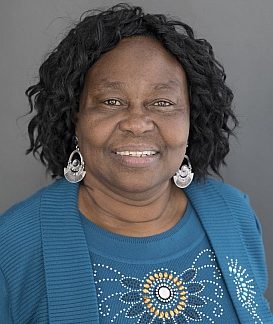
Shirley Pryce
FOUNDER – JAMAICAN HOUSEHOLD WORKERS UNION / FONDATEUR - SYNDICAT DES TRAVAILLEURS DOMESTIQUES JAMAÏENS
SHIRLEY PRYCE
FOUNDER – JAMAICAN HOUSEHOLD WORKERS UNION
Shirley Pryce is one of the founders and current President of the Jamaica Household Worker’s Union, the Caribbean Domestic Worker’s Network, and the Antigua Domestic Worker’s Association. She is also one of the founders of the International Domestic Worker’s Federation, where she holds an executive position.
A former domestic worker for 31 years, and a human rights advocate for 29 years, Shirley has long been championing the empowerment and rights of domestic workers around the globe. She was instrumental in getting Convention C189 (Convention on Domestic Workers) on the agenda of the International Labour Organization and one of two persons from the Caribbean who lobbied 183 countries for the adoption of C189. She was also part of a team that fought for the adoption of ILO Convention C190 (Convention on Violence and Harassment).
As a domestic worker, Shirley suffered abuse at the hands of her employer, which included spending nights sleeping in the dog house. Shirley decided to fight her way through her circumstances by acquiring an education; she would attend school in the evenings and work during the day. In 2011, she completed a Bachelor’s degree in Social Work from the Jamaica Theological Seminary and in 2015 she got a scholarship from Pennsylvania State University where she completed an Advanced Master’s degree in Labour and Global Workers’ Rights.
Internationally, Shirley is an elected Board Member of the Association for Women’s Rights in Development (AWID) and a member of the Caribbean Advisory Group to the United Nations Women and Gender Issues. Shirley was also part of the Jamaican NGO team that produced the alternate report on the Convention on Elimination of all Forms of Discrimination Against Women (CEDAW) at the United Nations.
Shirley is now travelling the world, sharing her experience and positioning Jamaica as a model for organizing domestic workers.
——————————————————————-
FONDATEUR – SYNDICAT DES TRAVAILLEURS DOMESTIQUES JAMAÏENS
Shirley Pryce est l’un des fondateurs et présidente actuelle du Syndicat des travailleurs domestiques jamaïcains, du Réseau des travailleurs domestiques des Caraïbes et de l’Association des travailleurs domestiques d’Antigua. Elle est également l’un des fondateurs de la Fédération internationale des travailleurs domestiques, où elle occupe un poste de direction.
Ancienne travailleuse domestique depuis 31 ans et militante des droits de l’homme depuis 29 ans, Shirley défend depuis longtemps l’autonomisation et les droits des travailleurs domestiques dans le monde entier. Elle a joué un rôle déterminant dans l’inscription de la Convention C189 (Convention sur les travailleuses et travailleurs domestiques) à l’ordre du jour de l’Organisation internationale du Travail et de l’une des deux personnes originaires des Caraïbes qui ont fait pression sur 183 pays pour l’adoption de la C189. Elle faisait également partie d’une équipe qui s’est battue pour l’adoption de la convention n ° C190 de l’OIT (Convention sur la violence et le harcèlement).
En tant que travailleuse domestique, Shirley a subi des abus de la part de son employeur, notamment passer la nuit à dormir dans la niche. Shirley a décidé de se frayer un chemin dans ses circonstances en acquérant une éducation; elle allait à l’école le soir et travaillait le jour. En 2011, elle a obtenu un baccalauréat en travail social du Jamaica Theological Seminary et, en 2015, une bourse de la Pennsylvania State University, où elle a obtenu un Master complémentaire en droit du travail et droits mondiaux des travailleurs.
À l’échelle internationale, Shirley est une membre élue du conseil de l’Association pour les droits de la femme et le développement (AWID) et un membre du groupe consultatif des Caraïbes sur les femmes et l’égalité des sexes. Shirley faisait également partie de l’équipe d’ONG jamaïcaine qui a rédigé le rapport alternatif sur la Convention sur l’élimination de toutes les formes de discrimination à l’égard des femmes (CEDAW) aux Nations Unies.
Shirley parcourt à présent le monde, partageant son expérience et positionnant la Jamaïque comme un modèle d’organisation du travail domestique.
My Sessions
Opening Plenary Day 1: Setting the tone: What should Canada’s foreign policy agenda be?
Room 118Robert Greenhill
Shirley Kimmayong
Shirley Pryce
Allan Rock
Meredith LILLY
As part of its contribution to the Summit on Canada’s Global Leadership, the Canadian Council for International Co-operation (CCIC) convened Canadian foreign policy thought leaders to form an advisory committee to create a Vision Statement for an ambitious and impactful Canadian foreign policy agenda. This short paper encompasses all facets of Canada’s international engagement and serves as a reflection piece […]